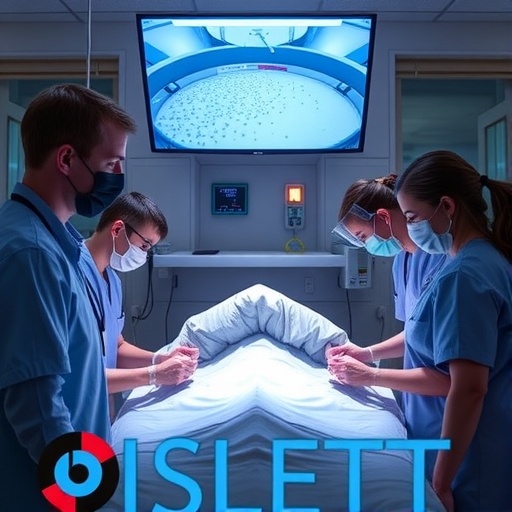In a groundbreaking advancement for the treatment of brittle type 1 diabetes, physicians at the University of Illinois Chicago Health (UI Health) have successfully performed the first FDA-approved islet cell transplant using Lantidra, marking a pivotal milestone in diabetes management. This development signifies the transition of islet transplantation from an experimental procedure to an established medical therapy within the United States. The recipient, a 69-year-old man from Illinois named Edward “Ed” Augustin III, experienced a life-altering cessation of his lifelong daily insulin injections following the procedure conducted on August 26.
Type 1 diabetes is a chronic autoimmune condition characterized by the destruction of insulin-producing beta cells in the pancreas. Patients afflicted with this disease depend heavily on exogenous insulin administration, which is complicated by episodes of both hyperglycemia and life-threatening hypoglycemia. A particularly severe subset of patients with brittle type 1 diabetes faces extreme challenges in blood glucose regulation, including hypoglycemia unawareness, where the body’s natural warning system fails to indicate dangerously low blood sugar levels. This condition heightens the risk of sudden incapacitation, seizures, and even death.
Lantidra represents a transformative approach as the first and only FDA-approved pancreatic islet cell therapy specifically designed to restore insulin production by transplanting healthy islet cells. These cells are isolated from pancreases donated by deceased donors and infused into the recipient’s liver, which serves as a new site for insulin secretion. This hepatic infusion circumvents the original pancreatic environment but effectively reinstates endogenous insulin regulation, thereby significantly limiting or eliminating the need for external insulin administration.
Technically, the procedure requires meticulous donor-recipient matching through the United Network for Organ Sharing (UNOS) to minimize immunological rejection. Once infused, the transplanted islets begin producing insulin in response to blood glucose fluctuations, markedly improving glycemic control. Unlike whole-organ pancreas transplants that involve major surgery and prolonged hospitalization, the islet transplant with Lantidra is minimally invasive, with recipients typically discharged within 24 hours post-procedure, as demonstrated by Augustin’s rapid recovery.
Ed Augustin’s medical journey underscores the clinical promise of this therapy. Diagnosed at the tender age of five, he has endured decades of glycemic instability, recurrent hypoglycemia, and its dangerous consequences, including frequent episodes of hypoglycemic unawareness. His prior two islet cell transplants, performed in 2011, provided a 12-year period free from insulin dependency, after which he experienced a relapse in 2023, resuming daily insulin therapy. The recent transplant marks his third and has again liberated him from stringent insulin regimens, a change he describes as “life-changing” and illustrative of his regained normalcy.
UI Health’s surgical leadership, notably Dr. Enrico Benedetti, emphasizes that age is no longer a limiting factor for islet transplantation, a critical consideration since conventional pancreas transplantation carries unacceptable risks in older patients due to its complexity and extensive recovery period. Lantidra’s implantation protocol, devoid of major incisions and surgical trauma, makes the therapy accessible to a wider demographic, including older adults who previously had limited treatment options.
From a pathophysiological perspective, islet transplantation targets the root cause of type 1 diabetes — the absence of viable, insulin-producing cells — rather than merely managing symptoms through insulin supplementation. By re-establishing endogenous insulin secretion, the therapy addresses glycemic variability and reduces the incidence of deleterious hypoglycemic events, which have been a leading cause of morbidity within this patient population.
Further clinical insights provided by Dr. Lorenzo Gallon, UI Health’s medical director of the abdominal organ transplant program, suggest that early intervention with pancreatic islet cell therapy could extend protective benefits beyond glycemic control. The therapy may mitigate progressive diabetic nephropathy by stabilizing blood glucose and preventing the sustained hyperglycemic damage that typically precipitates kidney failure. This protective effect is especially critical given the high prevalence of renal complications among individuals with brittle type 1 diabetes.
Statistically, type 1 diabetes affects over 1.4 million Americans, with approximately 80,000 afflicted by the brittle subtype. This group represents a significant unmet medical need owing to their erratic glycemic profiles and increased risk of severe complications that include blindness, limb amputation, stroke, and cardiovascular events. Lantidra’s availability exclusively through UI Health since November offers a life-altering intervention that moves beyond conventional insulin therapy, promising improved quality of life and decreased long-term sequelae.
The therapeutic development path of Lantidra traces back to comprehensive research led by Dr. José Oberholzer at the University of Illinois Chicago. Early-phase clinical trials conducted under his leadership laid the groundwork for the therapy’s successful FDA approval. These pivotal studies demonstrated the safety and efficacy of islet cell transplantation, culminating in a licensing collaboration with CellTrans Inc., where Dr. Oberholzer serves as president to facilitate commercialization and broader patient access.
Patient insurance coverage, a critical factor in realizing therapeutic benefits, represents a focal partnership between UI Health and payers. The institution coordinates with health insurance providers to secure reimbursement, ensuring that eligible patients can access this novel treatment without prohibitive financial barriers, thus promoting equitable healthcare delivery.
This FDA approval and its clinical implementation represent a major paradigm shift in diabetes care and organ transplantation fields, heralding a new era in which cellular therapies, rather than lifelong exogenous hormone administration, become the cornerstone of managing complex autoimmune diseases such as brittle type 1 diabetes. As data continue to accumulate, ongoing research aims to optimize islet preservation, improve long-term graft survival, and expand therapeutic indications, moving ever closer toward a functional cure.
For more comprehensive information on eligibility, procedures, and the clinical research underpinning this breakthrough, interested parties are encouraged to consult UI Health’s Islet Cell Transplant Program, which maintains an active patient referral and education platform.
—
Subject of Research: Pancreatic islet cell transplantation therapy for brittle type 1 diabetes using Lantidra
Article Title: First FDA-Approved Islet Cell Transplant with Lantidra Offers New Hope for Brittle Type 1 Diabetes Patients
News Publication Date: August 2023
Web References:
https://hospital.uillinois.edu/primary-and-specialty-care/transplantation-program/pancreas-transplant/islet-cell-transplant
https://today.uic.edu/new-therapy-from-ui-health-offers-fda-approved-treatment-option-for-brittle-type-1-diabetes/
Image Credits: Photo by Jack Martin/UI Health
Keywords: Type 1 diabetes, Islet cell transplant, Lantidra, FDA approval, Diabetes therapy, Pancreatic islet cells, Hypoglycemia unawareness, Autoimmune disorders




